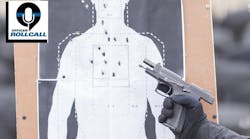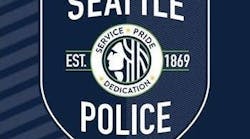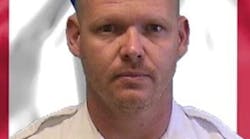Looking for something on the Web, a person can get tangled fairly quickly, especially when seeking information relating to science, technology or law.
The National Clearinghouse for Science, Technology and the Law (NCSTL), a program of the National Institute of Justice (NIJ), offers a free, searchable database to help law enforcement find what they're looking for at www.ncstl.org/search.
"Our mission is to support state and local law enforcement," says Carol Henderson, director of the clearinghouse. While NCSTL is located at the Stetson University College of Law in Gulfport, Florida, the database is not specifically for lawyers or law students, although they and others could benefit from searching the database as well.
Since NCSTL opened in 2003, more than 38,000 entries have been added to the database. "What makes us unique is the depth of information we provide," says Henderson, who has worked for the Federal Bureau of Prisons, the Department of Justice Criminal Division and the U.S. Attorney's Office in Washington, D.C.
A treasure trove of data
Searches can be done using keywords or by doing an advanced search, choosing from more than 30 topics. After a topic has been selected, there are at least 20 different resources from which to choose.
For example, a keyword search done using "Taser policies" would bring up abstracts for resources (296 at the time this story was written) under various headings:
- 1 for Agencies
- 31 for Books, Encyclopedias and Treatises
- 1 for College and University Courses
- 2 for Commercial Applications of Science/Technology
- 92 for Conference Proceedings and Abstracts
- 11 for Continuing Education Courses; three for Dissertations
- 13 for Internet Articles
- 9 for Law Reviews and Bar Journals
- 2 for Legislation
- 54 for Newspapers, Magazines and Periodicals
- 2 for Professional Associations and Societies
- 8 for Radio/Television Shows
- 55 for Scientific Journals
- 12 Web sites.
Abstracts list title, author, date and a brief summary. By clicking "more," a link will be made to the story (if it's available freely online) or to the resource where the article may be obtained. Some resources may require a fee before the story may be read. If the physical materials are needed and not available in local libraries, they can be obtained from the clearinghouse reference collection, which can be accessed via interlibrary loan.
One resource category worth highlighting is Conference Proceedings and Abstracts. Any time an NCSTL staff member attends a conference, abstracts or proceedings are entered into the database. By including these, people can see what's going on worldwide, what the hot topics are and where the latest research is being done.
When Henderson first started attending international meetings, she wondered why no one was compiling conference information. She saw people in different parts of the world doing similar things and they didn't know it.
The whole idea behind the database and the Web site is to have better communication, she says.
The mission statement of NCSTL is "To provide comprehensive scientific, technological and legal information, which will promote justice based on sound science and technology."
The database is very comprehensive with nothing left out if it is relevant to scientific, technological and legal information.
Among the topics that have the most records in the database are:
- DNA (more than 5,000 records)
- Digital evidence
- Fingerprints
- Forensic psychology
- Questioned documents
- Pathology
- Toxicology
Topics that are searched most include DNA, forensic psychology, pathology, fingerprints, digital evidence, bloodstain pattern analysis, smart cards, firearms, cybercrime, and firearms and toolmarks.
Chief William Berger of the Palm Bay (Florida) Police Department, who serves on the Clearinghouse Advisory Council, says the database is a one-stop source in the area of forensic science that is constantly expanding all the time.
The NCSTL database provides an important tool to help the everyday practitioner learn more about areas of which they're either uncertain or they don't have the capacity or technology to develop themselves, says Berger, past president of the International Association of Chiefs of Police (IACP) and present co-chair of the IACP's forensics committee.
"A lot of terms are used in law enforcement," he continues. "You'll hear of new technologies or an agency involved in an investigation and want to learn more. What this Web site does is direct you or link you to various sources that could help you look in a different direction."
An advanced search category that Henderson says likely will be added is Grants.
Based on data collected by the clearinghouse, she observes the most dire need is to get law enforcement more funding particularly for technology and in support of forensic science.
"Technology is not slowing down and neither is science," she says. "In order to be effective in law enforcement, you have to be on the cutting edge in those areas."
Looking for education?
Staying on top of technology and forensic science developments also means keeping up to date with training.
Partnering with law schools, professional associations, and federal and state agencies, NCSTL holds a free lecture series in the first half of the year. The first lecture, "The Complete History of Murder and Science in One Hour," was held in 2004 and presented by Michael Baden, M.D. A forensic pathologist and former New York City chief medical examiner, Baden is the co-director of the New York State Police Medico-Legal Investigation Unit and host of HBO's "Autopsy." The most recent lecture, presented this spring by James Young, M.D., special advisor to Canada's Public Safety and Emergency Preparedness minister, talked about "Terrorists, Hurricanes and Viruses: What's Next?" Young also is president of the American Academy of Forensic Sciences. This year's presentations were Web cast live and podcast. Free DVDs have been made or are being made of all lectures in the series, which is open to the public.
Free training specifically for law enforcement is being made available through distance learning. The outline for "Law 101" has been developed and will focus on courtroom testimony.
In addition, NCSTL staff members travel to talk about the clearinghouse and train officers how to use the database. For example, in 2005, at the invitation of the sheriff in Jefferson Parish, Louisiana, Henderson trained Louisiana law enforcement agencies as well as representatives from a federal agency in courtroom testimony and the use of the NCSTL database. In turn, NCSTL partners with law enforcement to offer a scientific evidence course for law students, in which officers teach students how to process crime scenes, among other things.
Many topics of interest to law enforcement will be presented at the next National Conference on Science, Technology and the Law, November 2 to 5 in St. Petersburg, Florida. Topics presented will include: identity theft; science, law and law enforcement of methamphetamine; less-lethal technology, such as electronic stun devices; forensic evidence case law developments; a legal update on the consideration of fingerprint evidence and fingerprint identification; forensic psychology; and biogeographical ancestry prediction, which determines where someone comes from geographically based on DNA. Pre-conference workshops will focus on tracking sexual predators, DUI standards (toxicology and behavioral models) and how to present forensic evidence in court. The conference registration fee is discounted for law enforcement officers. More information is available at http://ojp.usdoj.gov/nij/events/ncstl/welcome.html.
Partners in info sharing
The work of the clearinghouse shows evidence of many partnerships.
Partnering with the National Forensic Science Technology Center, the clearinghouse developed the Law Enforcement Evidence Policy Review and Integration Project.
The pilot project with Florida law enforcement involves reviewing evidence policies and developing a model policy.
"We want to look at the evidence handling policies and procedures that are out there and provide recommendations to improve their effectiveness," says Henderson, a professor of law at Stetson who has presented more than 200 lectures and workshops on topics of evidence, courtroom testimony and professional responsibility.
In addition to training and the evidence policy pilot project, another example of partnerships is the many organizations of which clearinghouse staff members are members.
For example, Henderson is a member of the IACP's forensics committee, the secretary of the American Academy of Forensic Sciences and a member of the NIJ General Forensics Working Group, in addition to serving on seven other advisory councils and working groups.
"We're very well plugged into the needs of law enforcement," she says.
Rebecca Kanable is a freelance writer specializing in law enforcement topics. She lives in Wisconsin and can be reached at [email protected].


